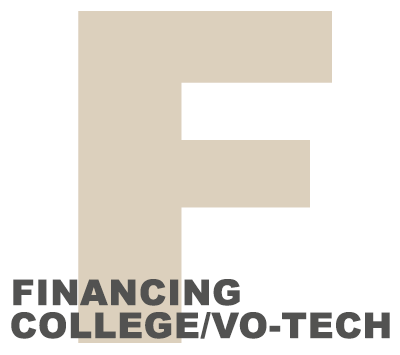Here is a list of resources for financing college:
Do Your Research Before Taking Out Student Loans
By Bonnie Spain

I am a huge believer in higher education whether it means you will attend a vocational school or a university. But I am not a believer in taking out as much student loans as you quality for. Student loans have to be repaid. Many people underestimate how high student loan payments can be and the effect these loans have on their standard of living after college.
In the past it was not unusual for individuals considering college to be advised – borrow what you can, you will find a good job when you are finished. That advice is no longer true and can give a person a false sense of expectation. Even a college graduate can find it difficult to find a job.
Before you sign up for college, whether you are a non-traditional or traditional student, you need to do some research. What fields are you interested in? How many students with the degree you are looking at actually found jobs? Upon graduation what can you expect to make in a starter job? Will there be plenty of jobs available? Will the jobs be in the area you want to live? Will you move to find a job? It is your responsibility to find the answers to these questions.
The field you choose may dictate whether or not you can work while you go to college. If you are going for an advanced medical degree you may not be able to work while going to school. However, if there isn’t any reason you can’t work while going to school you should consider working part-time. The less school loans you have to borrow the better.
Once you have researched your field, you need to research vocational schools or universities. What is the cost of a degree (all fees included) in the field you are interested in? Will you live on campus or off and what is the cost? The cost of an education can vary widely.
Student loan debt now exceeds credit card debt. It is important that you do your research before heading off to college.
The Cost of College and Defaulting on Student Loans

It is important to do some research before choosing a vocational school or university. What is the demand for the field you are interested, what will these jobs pay and where are these jobs located?
Higher education is a good investment, you just need to make this decision based on facts. According to College Board, the average cost of tuition in state at a public university is $9,650 a year, out of state is $24,930, and in a private university is $33,480. This does not include room and board. The average room and board per year is $10,440 for a four year public college and $11,890 for a 4 year private college. This means, if you borrowed for both tuition as well as room and board the cost of a 4 year education could range from $80,360 to $181,480.
While the number seems staggering you do have options. Is there a university where you already live that offers the degree you are interested in? Living at home rather than in the dorms may be an option you consider. If you work a full-time job during the summer at minimum wage you could bring home nearly $4,000. This would put a dent into your room and board or tuition. You need to examine all types of financial aid available from the vocational school or university you choose.
Based on 10 year repayment at an interest rate of 6%, if you borrow $80,360 (the average amount of tuition for an in-state public university) your monthly payment would be $892. If you borrowed $181,480 (the total amount for a private university including room and board) your monthly payment would be $2,015.
A person with a master’s level degree could easily have over $100,000 in school loans. It will be much more difficult for a person with a master’s in theology to earn an income out of college to repay those school loans than a person with a master’s level medical degree. Both are worthwhile degrees but one has a much higher starting wage for graduates - something you have to factor in when borrowing for college.
Defaulting on student loans not only affects your credit, it can affect your employment opportunities. Many careers in business, the medical profession, and security –related fields require you to have good credit. Defaulting on a student loan mars your credit. There are cases of nurses and doctors who defaulted on their student loans and found they were unable to practice in their fields. Bankruptcy rarely solves the problem of a defaulted student loan. In most cases you cannot file bankruptcy on students loans – you would need to contact an attorney for specifics.
A little research upfront will go a long way in finding a field of study, financing your education and finding a job.
Types of Student Loans

You have done your research, know what field you want to study, what the placement rate is for jobs upon graduation, the average pay for starting graduates, and where the jobs are located. You applied to one or more vocation schools or colleges for admissions. Now you receive an award letter and you are trying to figure out what it means. What you really want to know is what is the total per year for everything and what are you responsible for. Here are some of the things you need to know:
There are federal student loans and private student loans. Government loans usually have more favorable terms than private student loans. There are four types of federal student loans: Direct Subsidized, Direct Unsubsidized, Direct PLUS, and Federal Perkins. The Direct Subsidized Loan is for undergraduates who show a financial need. Interest is usually not charged while you are in school. Direct Unsubsidized do not require the student show a financial need. Interest is paid while you go to school. Direct Plus Loans are for parents and a financial need is not required. Interest is paid while the student is in school. Federal Perkins loans are made through the school and depend on your financial need and the availability of funds at the school.
Grants and scholarships are money that doesn’t have to be repaid. However, they often come with a requirement such as maintaining a certain grade average or participation in a sport. Make sure you understand the requirements.
What is the total amount of money you need to attend the vocation school or college? Make sure the figure you are looking at includes not only tuition and room & board, but also fees such as labs, parking, sports fees, etc. You will also need to need to consider the cost of textbooks.
There are other expenses you may need to consider. Do you have travel expenses to and from college? How often will you incur those expenses, monthly or for holidays only?
My belief - a freshman student should always be responsible for all or a portion of their first year. 28% of freshman at a 4 year college don’t return for their sophomore year. Attending college is an opportunity for a better future and that opportunity costs money. A freshman student needs to have a personal investment in that first year so they make the most of that year, get passing grade, and return for their sophomore year.
